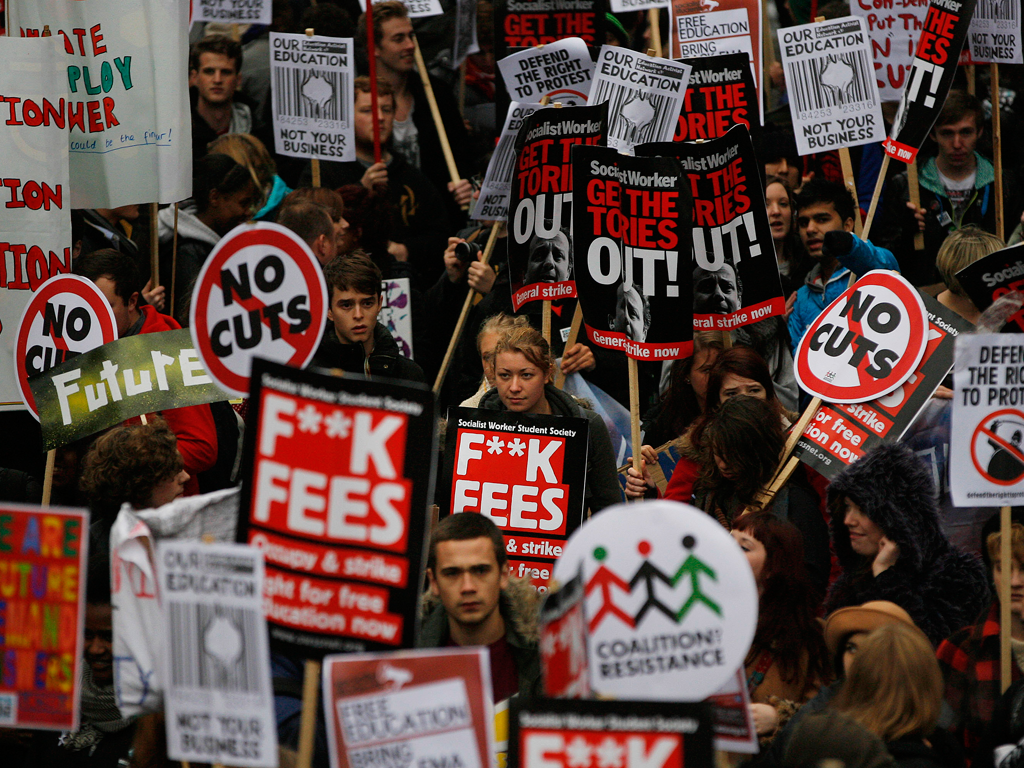
The NUS has released a damning report following their latest student demonstrations in London last November.
The investigation lambasts the NUS for the expensive foray, which garnered little media attention, left NUS President Liam Burns forced off stage and ultimately made the student body 'less credible' as a result.
Following feedback from over 1,000 participants, from students to union staff, #Demo2012 was heavily criticised for its lack of cohesion, obvious objectives and low turnout – the 5,000 demonstrators accounted for only a tenth of the number of students that took part in the infamous petition against tuition fee rises in 2010.
Unlike the obvious outcry against tripling the cost of university in 2010, Demo 2012 struggled to gain support with its open slogan of “Educate, Empower, Employ”, the report found.
Antony Haddley, union affairs officer for Leeds University Student Union, agreed that many students were left nonplussed by the catchphrase.
“We really didn't engage with the slogan and instead invited students to tell us what they wanted to protest about,” he said. “I believe student unions and Exec officers should be facilitating the debate rather than driving a particular political agenda.”
It was hoped that there would be a larger range of issues tackled by the protesters in light of this motto, but ultimately there was little cohesion, with some suggesting that there was a sense that students were perceived negatively for advocating 'let's just have another demo!' without reason.
Haddley suggested 'there were pockets of sympathy' from the public on the day, but 'on the whole the event pandered to public opinion that students protest for the sake of it'.
Yet, this did not hamper the NUS from spending large amounts of money on the march. Stewards and staff in place for security, safety and information cost in excess of £24k, rally and march costs were just shy of £20k, while the controversial use of Kennington Park, which many did not believe to be a suitable location, cost over £5,500.
In addition, the salary contribution from NUS staff themselves was over £50,000, with the report deeming the extensive costs to be 'unquantifiable'.
As a result, the protest was seen as vague and lacklustre, and fought no obvious policy. People suggested that there was 'no ‘tangible’ outcome', there was 'more negative effect than positive message' and students are believed to have got 'slightly lost in the message of the day and what we were for'.
Kallum Taylor, student president of the University of York, suggested that the event left many 'unfulfilled'.
He noted that the disappointing results of the demo were notable at the recent NUS conference. “I think the NUS turned inwards a little and reassessed its relevance to students. There was very much a sense of ‘getting back on our feet',” he said.
Only 43 per cent of students believed the event was relevant to them, despite unions having voted in favour of a demo early last year. A majority of the student body felt that this protest did not represent their opinions or their problems, and were left disappointed by the expense and ineffective approach of the demo, when the NUS should have focused on other student issues.
It is believed that only four per cent of the public and 16 per cent of students were aware of the protest when it happened.
The report added that 'many students’ unions were reluctant to mobilise for the demo due to not wanting to prioritise participation in a campaign activity with no aim and, therefore, felt less supported by NUS in other areas during this period'.
However, Taylor suggested that voting for the event left a lot of blame with individual student unions.
"It was a harder sell than 2010, but if you vote for something then you have to do your bit in fulfilling your part of the collective action, otherwise, just don't vote for it. Clicking attending on Facebook isn't enough."
More positively, Taylor said there was great support from first year York undergraduates, who now pay the £9,000 tuition fees. Haddley also believes that local events in Leeds helped to “re-engage students who are apathetic about influencing local and national government.”
The unions that The Independent spoke to said they would participate again under the right circumstances. Haddley said 'as long as the students want another demo, we’ll do it', whilst Taylor concluded that 'SUs and the NUS need to get ready now and start influencing for the 2015 election'.
Subscribe to Independent Premium to bookmark this article
Want to bookmark your favourite articles and stories to read or reference later? Start your Independent Premium subscription today.

Join our commenting forum
Join thought-provoking conversations, follow other Independent readers and see their replies